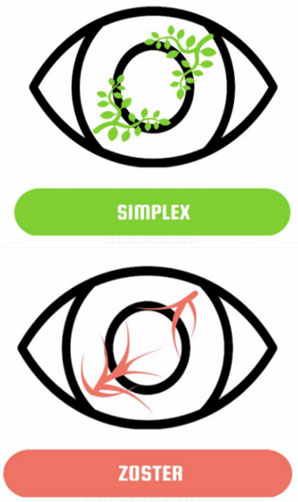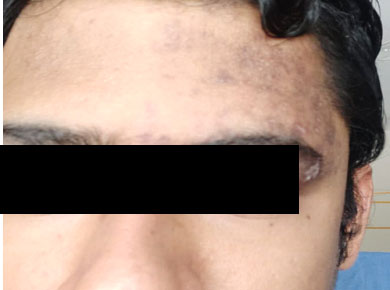Story of a banker affected by Herpes Zoster Ophthalmicus (HZO)

Covid pandemic has brought in lot of lifestyle changes. Lockdown indoors and mental stress have various impacts on the body. Incidence of certain disease have increased due to mental stress.HZO is one disease which is related to stress and lowered body immunity. Herpes is a DNA virus which commonly causes chickenpox in childhood. The virus is peculiar it hibernates and harbours in the body in the nerve cells (ganglion) for lifetime. The virus remains dormant and is activated when the immunity is lowered in the body.
Stress releases cortisol and adrenaline in the body and the cortisol increase is associated with immunity suppression. Suppressed immunity gives the herpes zoster virus to replicate actively and manifest in the affected nerve related dermatome as a skin rash and organ damage. Herpes zoster is slightly different then the herpes simplex virus but both herpes viruses have predilection for nervous tissue and skin.
Herpes Zoster can cause severe problems when it causes the eye to be infected. Herpes zoster ophthalmicus is an infection of the eye caused by varicella zoster virus. Herpes zoster ophthalmicus is the ocular involvement of an overall infection termed herpes zoster. Varicella zoster is the same virus that causes chicken pox. Once people are infected with this virus, usually by chicken pox as a child, it remains within the body in a dormant stage in the sensory ganglion (nerve roots). It is estimated that 95% of all adults harbor this virus and are therefore at risk for herpes. The risk of obtaining a herpes zoster infection during one’s lifetime is estimated at 10-20%.
Ocular involvement is complex and can create many different eye problems including:
- Eyelid sores with scar tissue creating future complications.
- Conjunctiva swelling (edema) and possible secondary infection within the first two weeks.
- Cornea can become inflamed/infected with several types of keratitis. Some cornea problems occur in the first few days of the herpes zoster ophthalmicus infection and others are not apparent for months later causing potential scarring and permanent loss of vision.
- Anterior chamber of the eye can become inflamed and a uveitis/iritis which can create scarring and lead to glaucoma weeks to years later.

A 26-year-old banker, presented Kenia Eye Hospital with severe head and pricking burning sensation over the forehead, with skin hypersensitivity over the right forehead and with reddish rash. Gave a history of burning and pricking pain over the right forehead preceding the rash by three days.He was unable to comb is hair due to pain since three days.He was also having cold and fever since past few days and had tested negative for COVID.
The banker gave no other contributory history but reported work related stress and sleep irregularities. Gave a history of chicken pox infection in childhood. The right side forehead and the eyelid was involved with skin rash; the tip of nose was not involved. On virtual examination except for upper eyelid skin rash the conjunctival redness the eye ball was spared.
Anti-herpetic viral medication was started orally and local application. Herpetic disease affects the nerves so the pain is excruciating and lingers for months after the rash heals. Special medication is given for the neuralgic pain associated with herpetic rash.
The rash over a weeks’ time healed and the crusted and the banker was back to work after a week break and continued with the medications as prescribed.
Herpes zoster has become a common disease in this stressed times, the sooner the treatment is started on detection of the disease is essential for curtailing the disease and avoiding complications.
At the first sign of possible Herpes infection, call your eye doctor and ask for an evaluation. The sooner antiviral medications are administered, the better the outcome.